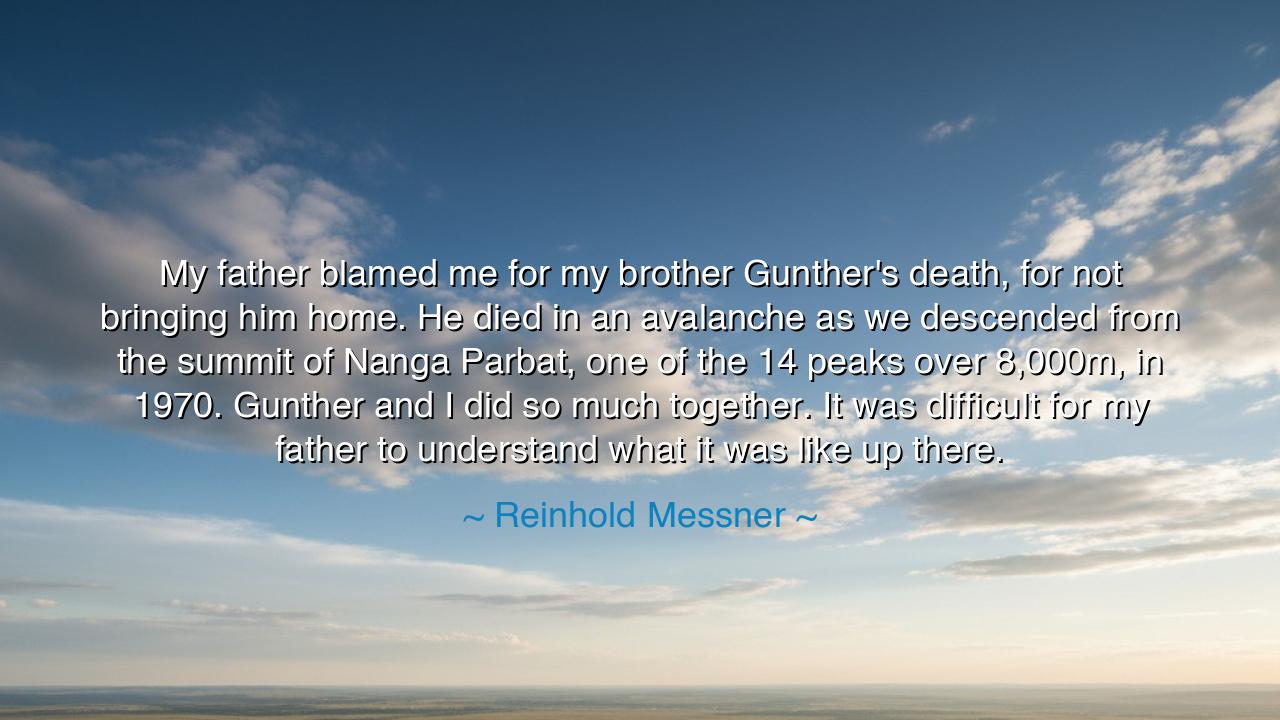
My father blamed me for my brother Gunther's death, for not
My father blamed me for my brother Gunther's death, for not bringing him home. He died in an avalanche as we descended from the summit of Nanga Parbat, one of the 14 peaks over 8,000m, in 1970. Gunther and I did so much together. It was difficult for my father to understand what it was like up there.






The mountaineer Reinhold Messner, one of the greatest climbers ever to walk the earth, once spoke these haunting words: “My father blamed me for my brother Gunther’s death, for not bringing him home. He died in an avalanche as we descended from the summit of Nanga Parbat, one of the 14 peaks over 8,000m, in 1970. Gunther and I did so much together. It was difficult for my father to understand what it was like up there.” In these few lines lives a lifetime of grief, of guilt, and of the chasm that opens between those who risk everything in pursuit of the impossible and those who remain below, watching and fearing. Messner’s words are not only a remembrance of tragedy; they are a meditation on loss, misunderstanding, and the solitude of those who walk at the edge of human endurance.
In the high silence of the Himalayas, where the air is thin and the world lies far below, Reinhold and his brother Gunther faced not only the mountain, but the truth of mortality itself. Nanga Parbat, “the Naked Mountain,” is a peak that has claimed countless lives — an altar to both courage and sacrifice. When the brothers descended from its icy crown in 1970, disaster struck. Gunther was swept away by an avalanche, never to return. Reinhold, frostbitten and delirious, survived the ordeal, only to descend into a different storm — one not of snow, but of grief and accusation. His father, unable to grasp the terrible conditions of the climb, placed upon him the unbearable weight of blame. Thus began one of the loneliest trials of Messner’s life: the battle not only with nature, but with memory and judgment.
“It was difficult for my father to understand what it was like up there,” Messner said. In that single line lies the eternal struggle of the human spirit to be understood. The mountain is a metaphor for every dream, every calling that pulls a soul beyond the boundaries of the ordinary. Those who answer that call — explorers, artists, seekers, revolutionaries — often walk paths invisible to others. They return changed, speaking a language the world cannot easily translate. Messner’s father could not see what his son had seen, nor feel the cold, the hunger, the terror of those high places. To him, there was only loss. But to Messner, there was also the unspoken knowledge that life and death intertwine on the summit, and that no mortal can command the mountain’s mercy.
History is full of such divides between those who dare and those who grieve. Consider the story of Amelia Earhart, whose flight across the Pacific became her last. To her, the sky was freedom; to her family, it was peril. When she vanished, the world mourned — but her spirit remained immortal among the clouds. So it was with Messner: his brother’s death became a scar that never healed, yet also the fire that burned within him. Out of that tragedy, he climbed higher, stronger, more determined. He would go on to become the first man to summit Everest without oxygen, to conquer all fourteen of the world’s highest peaks. In every ascent, he carried Gunther’s memory — not as a burden of guilt, but as a companion in spirit.
And yet, the wound between father and son speaks to something deeper — the distance between love and understanding. The father’s pain, like so many parents’ pains, was rooted in fear and sorrow. He could not comprehend why his sons risked their lives for a summit. But Reinhold, who had seen the world from the roof of creation, knew that such striving is the essence of being human. To climb is to seek meaning. To risk is to live fully. The father, bound by earth and loss, saw only tragedy; the son, tempered by the elements, saw both tragedy and transcendence. Thus, between them lay the mountain no rope could bridge — the mountain of perspective.
Messner’s words, then, are not only an elegy for his brother, but a parable for all who have walked misunderstood. They remind us that true purpose is often lonely, and that the price of vision is sometimes separation from those who cannot share it. The climber’s summit, the artist’s masterpiece, the philosopher’s revelation — each is reached at a cost, and not all who love the dreamer will understand that cost. But understanding is not always required; what matters is forgiveness — forgiveness of ourselves for surviving, and forgiveness of others for not knowing what it means to stand in our storm.
So, my friend, take from Reinhold Messner’s sorrow a flame of wisdom. When the world does not understand your climb — whether that climb is toward art, knowledge, truth, or purpose — be patient. Do not expect those who dwell below to see the summit as you do. Carry your vision with humility, and your losses with grace. Honor those who fell beside you by continuing the ascent, by turning pain into endurance, and endurance into meaning. For as Messner teaches, to live is to climb, and to climb is to touch the edge of the eternal — where love, grief, and greatness meet in the thin, pure air of the soul.






AAdministratorAdministrator
Welcome, honored guests. Please leave a comment, we will respond soon